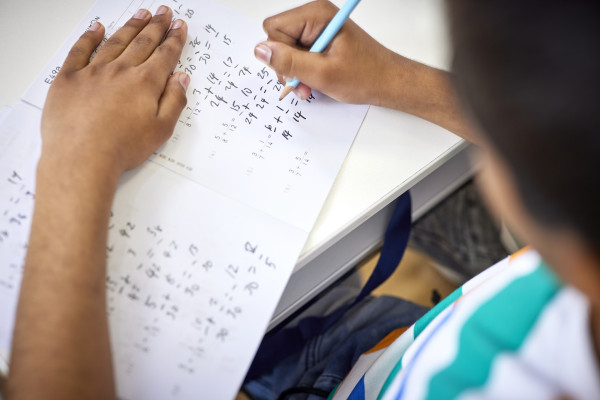When Romesh’s sister was a child, he says she sometimes ripped pages out of her Kumon worksheet book, scrunched them up and shoved them into her mouth.
She was desperate to get out of doing Kumon.
Kumon is an international programme where students can learn maths and English through completing worksheets that are designed to match their abilities.
Re: News spoke to four Kumon veterans about their experiences with the programme.
All of them said they gained a lot of “discipline” and “routine” during their years at Kumon. But most of them described the process as “rigorous”, “relentless” and “traumatising”.
Kumon in New Zealand
Kumon was founded in 1958 in Japan and now operates in over 60 countries.
There are 9428 New Zealand students enrolled in Kumon as of February 2024, Kumon Australia and New Zealand spokesperson James Wells says.
Wells says around 70% of those students study maths and 30% study English. Around 20% of students study both.
To send their kids to Kumon, parents pay $100 to enrol them and $160 per subject per month in fees.
Along with self-discipline and routine, Wells says Kumon students commonly report gaining “strong calculation and reading comprehension ability, study habits and confidence”.

Kumon student at a centre. Photo: supplied/ Paul Petch.
‘We regret even one unsatisfied student’
When asked how Kumon responds to students saying it “traumatised” them, Wells says: “The experience they describe is the antithesis of the learning experience our method aims to provide.”
“We regret even one unsatisfied student.”
Romesh was required to do Kumon at 6am every day
Romesh, who wants to keep his last name private, started doing Kumon when he was 10.
For the six years he did the programme, Romesh’s mum woke him and his sister up every day at 6am so they could do their maths worksheets before going to school.
Romesh says both his parents are highly educated and wanted their kids to have a good education after they moved to New Zealand.
“Back in Sri Lanka, it's common practice to do extra paid tuition outside of school,” the 35 year old says.
Romesh says Kumon became a big part of his life and he went on to work there as an assistant but he kept it hidden from his friends for a long time.
“You don’t want to be the 12-year-old kid who tells their white friends they wake up at 6am every morning to do maths,” the Sri Lankan-Korean says.
Romesh says Kumon didn’t make him ahead of his class in school but it gave him the ability to do calculations quickly in his head.
Kumon felt gamified, he says. “Reaching the next level, getting a high score… I couldn’t tell whether I was learning things or just memorising them really well.”
Romesh says he felt doing Kumon “ended up doing more harm than good”.
Kumon haunted Garrick on family holidays
Garrick Chong says he felt “depressed, anxious, stressed” during his Kumon years.
Like other Kumon students, Garrick had to go into a physical Kumon centre twice a week to be observed by a tutor.
He says one of the people who ran his Kumon centre “ran it like the navy”. Garrick would cry if he got a bad mark.
“Pushing so so hard on perfection… it fucks you up,” the 22 year old says.
Garrick’s Chinese migrant parents required him to take his Kumon worksheets on family holidays.
“We went to the Gold Coast but before we could head off to the theme parks, I had to do my Kumon,” he says.
As a child, Garrick felt like Kumon was controlling his life but when he told his parents how he felt, he says they weren’t receptive.
He lives in Auckland and says if he was a kid while the Auckland Anniversary floods were happening, his parents probably would have still made him do his Kumon during this extreme weather event.
Garrick says doing Kumon helped him get a few years ahead of his cohort in maths.
But he eventually started cheating and ditching his sessions at the Kumon centre, he says.
“It took [my parents] years to come around to the fact that I was cheating and that I had no motivation to do Kumon,” he says.
He completed seven years of Kumon by the time he was allowed to quit.
Why some migrant parents are drawn to Kumon
University of Auckland senior mathematics education lecturer Lisa Darragh says migrant parents she has spoken to are accustomed to classrooms where students sit quietly in rows and face the front.
Primary school classrooms in New Zealand have very different environments, Darragh says.
Seeing their child do worksheet-style tuition in Kumon might be more familiar and comforting to some migrant parents, she says.

Kumon student solving a maths worksheet at a centre. Photo: supplied/ Paul Petch.
Some migrant parents might also find their child’s classmates in New Zealand are learning content their child learned years ago overseas, as different countries pace through their curriculum in different ways, Darragh says.
That’s true for Romesh and Garrick — they both say their parents enrolled them in Kumon because they did not think the New Zealand education system was challenging enough.
Garrick says because Kumon is graded and standardised, it gave his parents a way to measure his success and compare it to other children doing Kumon.
Darragh says getting your education from school should be enough.
She says if New Zealand had a system where students needed tutoring to be successful, it would widen the gaps in society because not everyone could afford it.
Students are more likely to study maths if they actually enjoy it
“There is a place for independent worksheets in maths learning but it's only one part of a bigger picture,” Darragh says.
Darragh researches the relationship students have with the subject of maths.
She has found a lot of people commonly talk about “trauma, stress and humiliation” when reflecting on how they were taught maths.
Good maths learning involves students having a relationship with their teacher, investigating and collaborating to solve problems with real life contexts, she says.
Darragh says there is no doubt students learn through repeated practice but when that repetition is forced, she says students end up learning two things at once.
“You’re learning maths and you’re learning that maths is boring,” she says.
The relationship that a student has with maths impacts how likely they are to continue studying it, she says.
“You could be getting high marks but if you don't have a good association with maths, you’ll stop doing it as soon as you can.”

Young Kumon student smiling at a centre. Photo: supplied/ Paul Petch.
Kumon knows parents make decisions for their children
Because many of Kumon’s students are of preschool and early primary school age, it is understandable that parents make decisions for them, Kumon Australia and New Zealand spokesperson James Wells says.
Kumon’s approach is that if students are given material that matches their abilities and can progress at their own pace, they will “experience success” and be “enthusiastic to do more”.
And they “won’t need to be ‘forced’ to study”, Wells says.
Nailah enjoyed Kumon because she did it by choice
Nailah Zaman begged her parents to enrol her into Kumon when she was in Year 5 in 2014.
She moved from New Zealand to Australia when she was a child but says all of her friends back in New Zealand did Kumon and she thought it was “a cool thing to do”.
Nailah says her specific Kumon centre had a “nice environment” and she “made friends there”.
“My instructor was nice. She tracked my progress, gave me help. The staff were sweet and I could ask them for anything,” the 20-year-old law student says.
After graduating from the Kumon maths programme, she began working at Kumon as an assistant and has been in the role for five years now.
Sanskruti felt anxious going into her Kumon centre
Every time Sanskruti Patel walked into a Kumon centre, it felt like walking into an NCEA external exam hall, she says.
“Everyone felt super anxious, no one talked or joked around. Students seemed tired before they even got there,” the 23-year-old oncology PhD student says.
Sanskruti felt the same way and she complained about it consistently across the five years she did Kumon.
She says she was good at maths and English but her parents enrolled her in both Kumon subjects when she was 11 as a productive way to keep her occupied after school.
Sanskruti says Kumon felt neverending — “once you’re done with one thing, it's onto the next”.
She was awarded Kumon medals and trophies but she says it wasn’t validating and felt like a performance put on for her parents.
“I started trying to occupy myself with other school stuff so I had an excuse to not do Kumon anymore.”
Her parents let her leave Kumon when she got to Year 11 because NCEA was around the corner and they knew she would have a bigger workload to get through at school.
“It was also getting quite expensive to pay to do something that made me miserable,” Sanskruti says.
Reflecting on Kumon as adults
While writing his debut novel, Romesh says he woke up every morning and wrote 1000 words, taking what he calls a “Kumon approach”.
Discipline is important to Romesh but, as an adult, he questions whether Kumon’s structure leaves room for creativity or playfulness.
Nailah says Kumon really helped her stay ahead at school and played a huge part in getting her into good education opportunities.
She says if the Kumon instructor who taught her was still running a centre by the time she had kids, she “absolutely would” enrol them there.
Neither Romesh, Garrick or Sanskruti say they would enrol their hypothetical children in Kumon because they never chose to do it themselves.
Romesh says it's more important to him that kids do “something they’re interested in, that brings them joy”.
Banner photo: Composite image by Re: News. Photo source: Paul Petch, illustration source: iStock.
More stories:
How kura kaupapa Māori work
A former kura teacher shares her thoughts.
Your 2024 Young New Zealander of the Year
Meet the nominees and winner of this year’s award
Vapes are prescription-only in Australia. Should NZ do the same?
Or will that just create more problems.